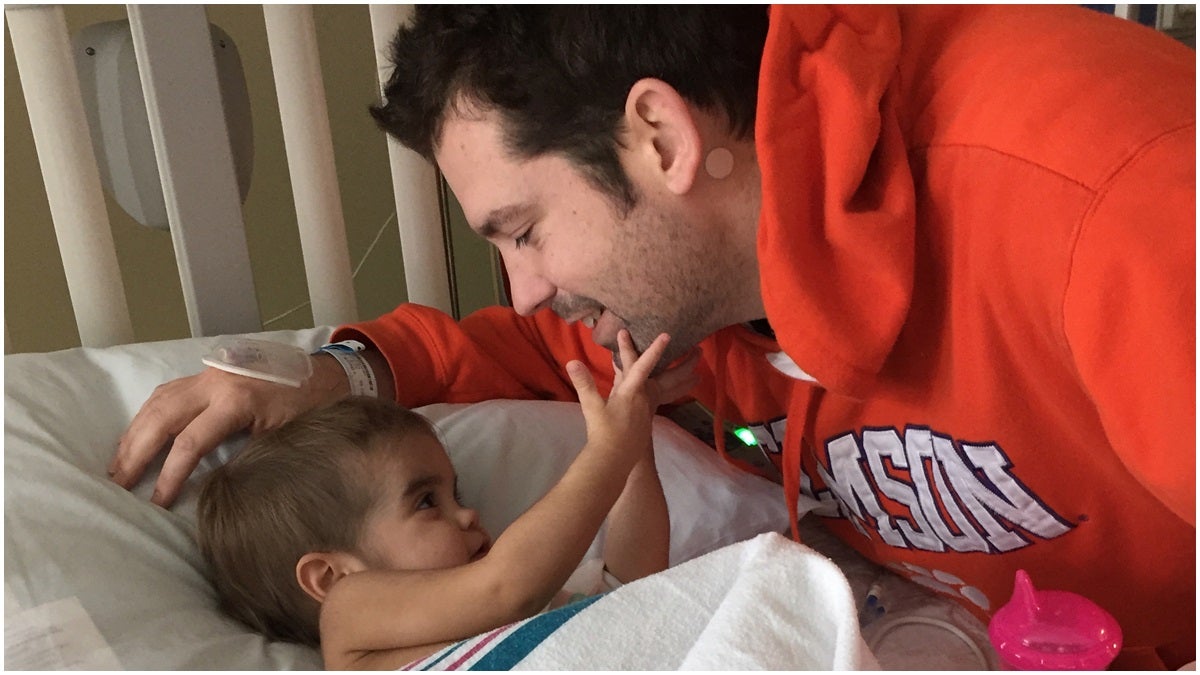New genetic testing lab coming to Delaware children’s hospital [video]

(Photo courtesy of the Lees) Piper and dad Chris Lee in Dec. 2014
The newly-expanded Nemours/Alfred I. DuPont Hospital for Children could soon be at the forefront when it comes to genetic testing, with help from a little girl and her family.
The hospital is in the process of setting up a genetic testing lab that will be located on its Wilmington campus. The lab will test for all kinds of kidney diseases in children.
Dr. J.J. Zaritsky, A.I.’s chief of pediatric nephrology, is spearheading the project.
Nephrology is the branch of medicine dealing with the kidneys. Zaritsky said the lab should be up and running by late summer, early fall.
Because genetic testing and DNA sequencing are still considered relatively new, this genetic testing lab puts A.I. on the cutting edge of medicine, giving doctors even more information to better diagnose and treat patients.
“Here, patients are able to get state-of-the-art treatment in their backyard. They don’t have to go to some hospital up the road or go across the country to get this test, it’s available right here,” Zaritsky said. “In fact, our goal is to have Nemours, A.I. duPont, as the center for testing, clinical testing, for nephrotic syndrome for the country.”
Zaritsky is in the midst of creating a genetic testing panel, broadening the spectrum of potential gene mutations found in children.
“We’re still in this kind of nascent stage where we don’t understand [whether] this change causes disease or not,” said Zaritsky, when explaining the complexities of genetic mutations. “The only way we’re going to know that is to collect enough DNA from enough people affected by the disease to say, ‘Oh well, this is disease-causing, this is not disease-causing.’ And we’re part of that process now by collecting that information.”
Piper’s story
Zaritsky is partnering with the Lee family of Garnet Valley, PA. Their 3-year-old daughter, Piper, is one of Zaritsky’s patients.
“It’s so nice to partner with a patient’s family,” Zaritsky said. “This shows you the benefit of patient advocacy. How powerful that can be is when the patients come to you with their own ideas or are able to partner, is that we’re able to achieve things I would never be able to achieve through, by myself.”
Zaritsky and Piper were introduced two years ago when parents Chris and Erin took their little girl to A.I., after noticing her face looked swollen and puffy one morning.
“They were running tests on her and basically the end result was we think she has a kidney problem, we don’t know what it is,” Piper’s dad, Chris said.
Doctors pushed the Lees towards genetic testing to nail down what exactly was wrong with Piper and time was of the essence. But because genetic testing was so new, the Lees had a tough time finding a lab that could perform the test within a reasonable time-frame.
“Early that summer we took some of her blood samples and we sent them to England, to Bristol, United Kingdom, to a lab there. It’s one of the only labs in the world that can do these tests,” Chris recalled.
About five weeks later, Piper was diagnosed with Denys-Drash syndrome, a rare kidney disease that leads to kidney cancer by the age of 3 and kidney failure. A tumor could start to develop at 18 months of age and quickly metastasize to her lungs. At the time, Piper was 16-months-old.
“For me, it was an answer and it was a good thing because now we had a road map for treatment,” Piper’s mom Erin said. “Even though we had the bad news of over 95 percent chance of having kidney cancer by the age of 3, very quick kidney failure, something that she can now pass on to a child, we had the great news of she’s not going to reject a kidney based on disease.”
So Piper’s kidneys were removed in October 2014 and that December Chris gave his daughter one of his.
But Chris said doctors still had to look at Piper’s kidneys to make sure they didn’t have any cancer cells present. “When they did that, they found that there were no signs of pre-cancer or cancer, so we were very, very lucky.”
And Piper is doing better than anyone imagined.
“You see her running around every day, climbing on things and probably doing more than her doctors would like her to do from that standpoint, but she’s just a normal, little girl and it’s awesome, it’s so good to see,” Erin said.
Piper’s Kidney Beans Foundation
“I truly believe that genetic testing saved Piper’s life,” said Chris, which is why he and Erin started Piper’s Kidney Beans Foundation. “One of the things that always bothered us through this process was the fact that it was so difficult for us to get the genetic testing done, that we had to send her blood to England.”
Through their foundation, they are raising money for A.I.’s genetic testing lab, and to establish a fund to subsidize the cost of the test for families who might not be able to afford it. Zaritsky said genetic testing can cost upwards of $5,000 from a commercial lab.
“We don’t feel that a family should be put into a situation where a doctor comes to them and says, ‘Well, we’d like to run this test on your daughter, but it’s not going to be covered by your insurance, we’re not sure how much it’s going to cost,’ and put someone in that kind of position. We want doctors to be able to just order the test knowing it’s the best thing to do for the patient and not have to think twice about it,” Erin said.
Piper’s Kidney Beans Foundation is hosting its first fundraiser, Piper’s Beanefit, on Thursday, May 12th, in Wilmington. Money raised will go towards A.I.’s new genetic testing lab and to establish a fund for families who can’t afford to pay for genetic testing on their own.
WHYY is your source for fact-based, in-depth journalism and information. As a nonprofit organization, we rely on financial support from readers like you. Please give today.


